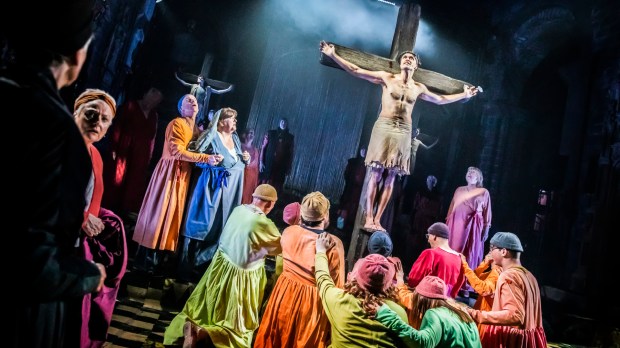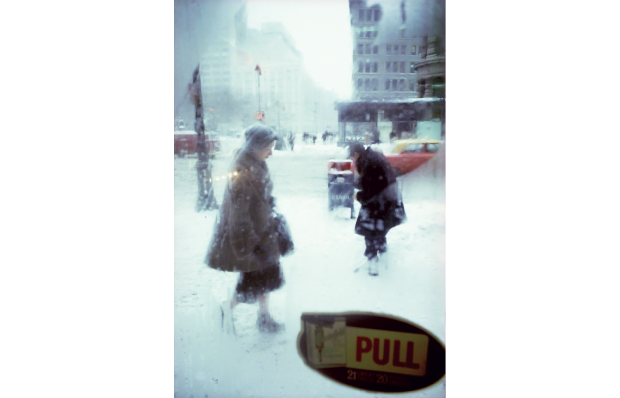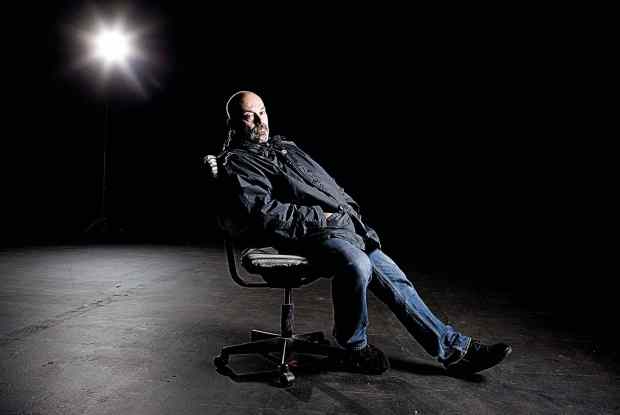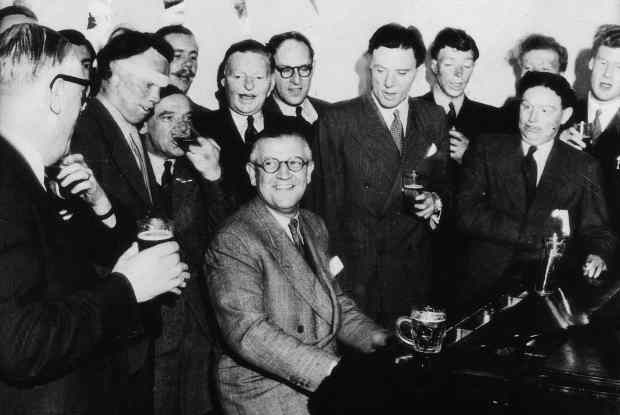Gosh. I wouldn’t mind being Peter Nichols. Eighty-six this month and still enjoying the easy domesticity and professional stimulation he’s benefited from since the 1960s when he was propelled to stardom by his play about raising a disabled daughter, A Day in the Death of Joe Egg. He lives in a penthouse flat in north Oxford on the verge of cow-dappled meadows, tufty footpaths and a low grey canal full of quacky coots and ducklings. He’s fit, sharp-witted and fun to be around. (After our interview he and his wife called a cab and went off to Corpus Christi to knock back champagne at a summer party.) He dismisses his age with a paragraph of jokey self-evaluation. ‘I’m a great one for, “every improvement makes it worse”, but that’s the age I’m at. It’s quite comfy actually, it’s quite nice. You can rail against everybody and berate them all for being young. Which is what I want to be. But now I can’t. So I’m angry about it.’ Not quite angry. Caustically amused, perhaps. He’s still producing new plays. Is he shouty at work, like some dramatists?
‘I was. For a long time I used to walk up and down reading all the words. But then you acquire a sense of exactly how the lines should read. When you give it to the actors, of course, they do something different with it. Actors will get it wrong if they can.’
His bankability has oscillated over the years but he’s riding a wave of public favour right now. Passion Play, his comedy about middle-aged bed-hoppers, is playing at the Duke of York’s (until 3 August). Simon Russell Beale starred in a hit production of Privates on Parade at Christmas. And Joe Egg was revived earlier this year at the Rose, in Kingston, and starred Ralf Little. ‘Stephen Unwin, the director, has a disabled child and he based the epileptic fit on his child’s, which wasn’t the same as ours. I always have to teach them how to do it. Steve was quite shocked when I told him what ours was like. Wasn’t nearly as theatrical. Ralf was intelligent enough to say. No, that’s right. Because it’s unusual. No one will expect that.’
Nichols belongs to the talent-cluster of world-class dramatists who emerged during the 1960s and early 1970s: Pinter, Stoppard, Frayn, Ayckbourn, Bennett and Simon Gray. What happened?
‘Subsidised theatre,’ he says without hesitation. ‘We could put on plays that the public didn’t want. Force them down their throats. Even if they came off pretty soon, they were seen. The critics had noted them. They were part of theatre history. This can’t happen in a commercial sector. The West End is not a nursery of talent. People go [to a play] like they go to Ascot or the Royal Academy summer show. It’s an occasion.’
He’s frustrated that producers prefer his vintage plays. ‘I grumbled for years that no one would do my stuff. And a journalist asked recently if I felt hard done by and I said, “Don’t put that! For God’s sake! I’ve got three plays on in London, I’ll look churlish if I start saying I’m hard done by.”’
But he’s bugged by the public’s unpredictability. ‘It doesn’t have any logic to it. There are composers who wrote 20 operas and they’re known for one overture. Why is The Mousetrap still on? It’s a mystery. I mean Blood Brothers — I have nothing against Willy [Russell], I like him very much — but I don’t think it’s that distinctive that it should run for 50 years or whatever.’
His tip for new playwrights: find a good director. ‘If you were lucky, you had someone as good as Michael Blakemore. You didn’t always get on with them, it was sometimes rather uneasy, rather like marriage.’ The pair fell out, ‘sort of’, over a production of Forget-Me-Not Lane. ‘He tried to cut me out of rehearsals. He won’t do my plays any more but we’re still friends, we still meet. We stayed in his house in Biarritz. He stayed in our house near Bordeaux.’ He seems to miss the support. ‘Without someone to fight your corner, you’re on your own.’
In his study he shows me a shelf of plays waiting to be produced. A Better Mouse-Trap is about Maxim and his machinegun. Cod Piece is a crime spoof set in Elsinore. He explains: Hamlet finds his father’s corpse and phones the cops who send a tough-talking female detective, perhaps played by Helen Mirren, to investigate. The dialogue is written in iambic pentameters. ‘It gets quite easy the more you do it. Rum-ti-tum-ti-tum-ti-tum.’ The play’s future is uncertain but a celebrity read-through in a West End venue on a Sunday evening, (when luvvies get the night off) is being discussed.
He has high hopes for his play about Wallis and Edward set in Portugal at the start of the war. ‘They were staying with a famous fascist banker, “Spirito Santo”, and they thought Churchill would send a battleship to collect them. A battleship? Fucking war on. Wonderful. The egotism of it. Churchill sent a seaplane. But Wallis said, “No! I can’t fly! I’m a flightless bird.” So they sat there waiting, and playing off the Nazi emissaries who were saying, “We’ll give you x thousand pounds to wait here and when England surrenders we’ll install you on the throne as Edward VIII and Queen Wallis the First!”’
Historical dramas are in vogue at the moment. But he seems reluctant to canvass interest in his back-catalogue. ‘Maybe I’m a bit tender.’ Then he pitches me his play about Cary Grant. ‘I know everything about him. He came from my area, north Bristol. He was in Hollywood and famous and he always thought his mother had died. He was told, no, she was still alive, in an institution in Bristol, where his father had committed her, so he could marry another woman. He went out and met her.’
Grant wanted his mother, Elsie, to live with him in Hollywood. Nichols impersonates her. ‘’Ollywood? Wurrrzat? Oi don’t know anyun thurr.’ Grant installed her in a plush care home in Bristol where in later life her memory began to falter. Nichols plays out a scene with a nurse. ‘“Letter for you, Mrs Leach, from your son.” “Who’s that? Arrrrchie?” “Cary Grant.” “Cary Grant’s nutnta do wid me. Moi son’s Arrrrchie.”’ I urge Nichols to send the script to Ed Hall, at Hampstead. He loves biographical dramas. ‘Maybe, maybe I should push it,’ says Nichols warily. ‘But who’s going to play Cary Grant?’ ‘There’d be queue a mile long,’ I tell him. ‘Headed by Jude Law.’
Got something to add? Join the discussion and comment below.
Get 10 issues for just $10
Subscribe to The Spectator Australia today for the next 10 magazine issues, plus full online access, for just $10.
You might disagree with half of it, but you’ll enjoy reading all of it. Try your first month for free, then just $2 a week for the remainder of your first year.













Comments
Don't miss out
Join the conversation with other Spectator Australia readers. Subscribe to leave a comment.
SUBSCRIBEAlready a subscriber? Log in